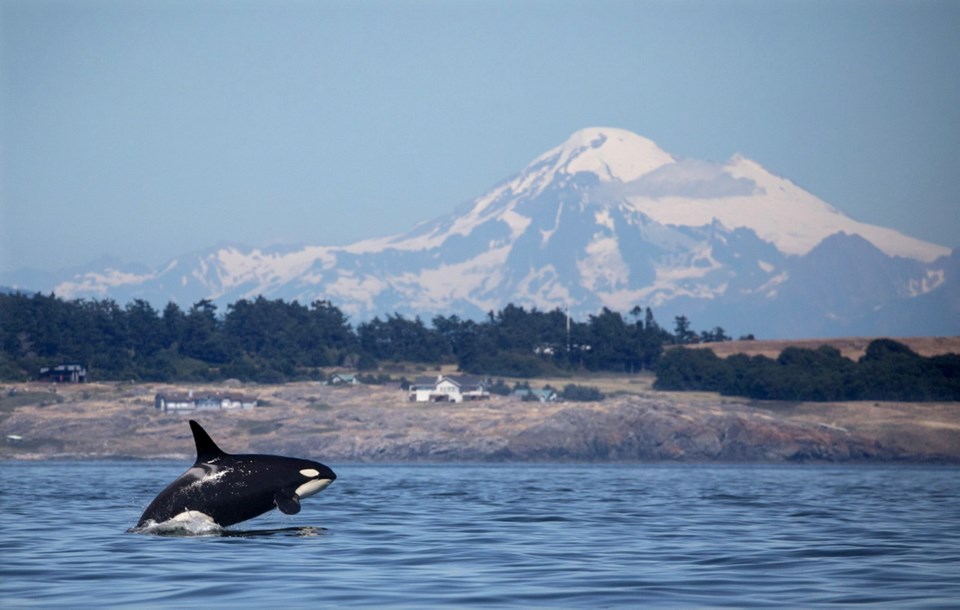At some point, decades from now, the last remaining members of J pod, one of the local family groups of endangered southern resident orcas, might turn to each other and reminisce about the COVID-19 pandemic — or their version of it.
“Do you remember that time when the world fell silent?” Tsuchi (J31), for example, might call.
“Yeah, it was weird,” the other one — possibly Tilem I’nges (J49) — might reply.
“The ocean went from an unending grind, rumble and clatter to the peaceful gurgle of waves, the snapping of shrimp, and the burping of geoducks almost overnight. You could hear a salmon fart half a kilometre off and grey whales calling to each other all the way out in the ocean.”
Quiet waters have been an unintended benefit of the COVID-19 crisis.
When the federal and B.C. governments declared restrictions on human movement and interaction to slow the spread of COVID-19 in March, the resulting tourism, trade and transportation shutdowns brought a corresponding reduction in sea-going traffic along the B.C. coast. Cruise ships and whale-watching boats stopped all operations. Traffic by cargo vessels also fell.
Southern resident orcas could suddenly hear themselves think — some for the first time ever.
Marine noise around the world has doubled with each decade since 1980. The volume rose apace as international trade networks, increased global tourism, and technology that enabled ships to cross oceans more quickly emerged. Even when not travelling, sea traffic can be noisy.
Many ships calling at the Port of Vancouver in recent years idle engines at anchor for weeks as they await enough cargo to make moving on to other ports worthwhile.
Even with the Port of Vancouver’s noise-reduction program, which has provided incentives since 2017 to cargo ships travelling to and from Vancouver to reduce speed and, therefore, noise and pollution, local waters remained busy and noisy.
In May, the federal government extended the reduced-speed and -noise requirements to help protect the endangered local orca population.
Like other whales, orcas rely on echolocation to survive. They make clicks, whistles and pulsed calls to help them hunt, communicate and find their way in dark waters.
Sound travels in waves. The soundwaves made by an orca’s clicks and calls move through the water and bounce off the objects, big and small, that they encounter. Orcas sense those echoes in much the same our eyes sense light reflecting off objects around us.
Orca read the echoes to locate and track schools of chinook salmon, their preferred meal, as well as to distinguish other critters, boats, or kelp forests that might be nearby and to case the local seafloor terrain.
They also whistle and call to communicate with each other and to interact socially — to plan their chinook-hunting tactics, for example, or to gossip.
“Remember that dolphin from the deep ocean tropics that we met that year?” Tsucho might say in that future conversation. “It was travelling toward Alaska, remember? I wonder what happened to it. I can’t imagine the water temperature up there would be to its liking.”
“Well, you know — tourists! Here one day, hanging out at some beach the next.”
The orca would, of course, be referring to the striped dolphin discovered on a Haida Gwaii beach by a woman walking her dog last month. It was the first striped dolphin to be seen by humans that far north, normally preferring deep, tropical to warm-temperate ocean waters like those found off the continental shelf west of California and Mexico and around Hawaii.
While tropical marine mammals may have been visiting B.C. this spring, human tourism to the coast remains at a near-standstill for the time being. Trade up and down and to and from the coast is substantially reduced.
However, as restrictions lift and industries and businesses figure out how to maintain safety or an effective coronavirus vaccine is found, the brakes on sea travel will ease.
And ocean noise will crescendo once again.
“So, how are you doing there, Tsuchi?” Tilem I’nges might whistle during that conversation that has yet to take place decades in the future.
“What? Speak up, will you — it’s hard to hear anything around here these days.”



